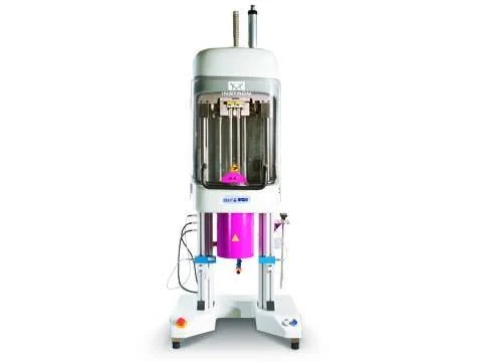ASTM D3835: Extrusion of neat and carbon reinforced polyether ether ketone (PEEK)
Due to its excellent chemical resistance and mechanical properties at high temperatures (up to 400º C for reinforced grades), Polyether ether ketone (PEEK) is used widely in aerospace, automotive and medical industries. In addition to representing superior combination of strength, flexibility, chemical resistance and ease of processing, PEEK can further give exceptional mechanical and thermal properties when reinforced with fillers like glass or carbon fibers. Extrusion of PEEK is of greater interest due to above mentioned reasons.
We tested unreinforced PEEK (neat PEEK) and carbon-fiber-reinforced PEEK (C/PEEK) on a CEAST Capillary Rheometer to understand its flow characteristics. We used three flat head capillaries with length to diameter ratios of 5, 20 and 30 to test neat PEEK and C/PEEK at 400ºC. The preheat time was set to 6 minutes conforming to ASTM D3835 and material was charged at a constant force of 1000 N. Tests were performed to understand the processing window for C/PEEK and obtain viscosity values at respective shear rates.
It is observed that neat PEEK is representative of bulk polymer behavior and shows viscosity dependence on shear rate. C/PEEK on the other hand is not as shear sensitive, possibly due to less mobility of the polymer chains in fiber-polymer interaction. We also notice a viscosity increase after higher residence times of material in Rheometer barrel.
For filled materials like C/PEEK, conical inlet dies can help in achieving a homogenous flow due to a cleaner convergence of the melt into a capillary as compared to flat head dies. The conical inlet dies will not only aid in a more stable & continuous flow but also ease the post test cleaning process.
CEAST SmartRHEO Series: Capillary Rheometer Systems
Thermoplastic materials are processed as fluids under the effect of temperature and pressure. The ability of plastics to be formed into a wide variety of shapes, by the common plastics conversion processes, has a fundamental importance in polymer science and application. The innovative Instron® line of CEAST SmartRHEO Series of Capillary Rheometer systems are designed for an accurate investigation of the rheological properties of polymeric materials.
- Produtos
- 09/22/2014
- 3.45 MB


